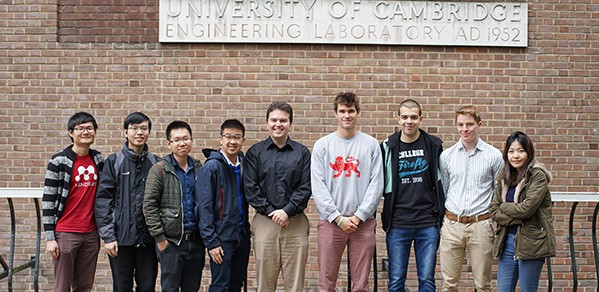
Two teams of Cambridge Engineering students have achieved second and ninth place in the first phase of a global construction competition, with one team through to the final.
We would definitely recommend other Cambridge undergraduates take part in next year’s challenge. It teaches you the basic ideas behind the construction business and its operation.
Team CUEDConstruct
Team CUBE – Ziqing Liew, Julian Ting, Zhi Hao Kok and James Liew – will enter the final of the Chartered Institute of Building (CIOB) Global Student Challenge on July 18-20 in Hong Kong. The team achieved second place with a score of 2923 in phase one.
The competition challenges students to manage a virtual construction company. It tests the teams’ strategic, marketing and financial skills. It is run as an online interactive game and utilises MERIT (Management Enterprise Risk Innovation and Teamwork). The game is designed so that each team member takes on a role such as managing director or financial manager.
It is the first time that the University of Cambridge has entered the competition, which also saw fellow third and fourth year Engineering students – Ben Langslow, Richard Mihaylov, Rory Bradshaw and Jae Lee – who made up team CUEDConstruct, finish in ninth place in phase one with a score of 2458. The top six teams go through to the final.
James Liew, leader of team CUBE, said: “It has been a rewarding experience so far. The game offers us an opportunity to manage a virtual construction company as directors. Our strategy was to achieve high growth while maintaining profitability to impress our shareholders.
"While optimising resource allocation is necessary, the tricky bit is to find the balance by projecting our performance a few periods forward. At the same time, we also gauged what other teams’ decisions were to out beat them. Eventually, our strategy worked out well and we are delighted to have reached the finals of the Global Student Challenge where we can't wait to compete with the other five teams in July."
Richard Mihaylov, leader of team CUEDConstruct, said: “We would definitely recommend other Cambridge undergraduates take part in next year’s challenge. It teaches you the basic ideas behind the construction business and its operation. The challenge shows that flexibility and correct resource allocation, be it personal or more globally orientated, can make the small difference between being on top of the competition or just a tiny step below."
Dr Ioannis Brilakis, Laing O’Rourke Lecturer in Construction Engineering, who assembled the two teams, said: "It is amazing to think that this is the first year Cambridge has competed. We were up against 45 teams from around the world in the preliminary phase and both of our teams reached the top 10. It is even more amazing to know that team CUBE has a real shot at winning the final. Many thanks to their industry adviser Niki Fanouraki from Atkins who helped them get started and who has agreed to accompany them to the final. Also many thanks to the Civil Division and the Laing O'Rourke Centre for sponsoring the teams' entry fees.
“The students had such a fantastic time taking part in the CIOB Global Student Challenge and are looking to compete again next year.
"Dr Mohammed Elshafie and I revised the 4D16 Construction Management module two years ago so that it covers some of the topics the students have been tackling in the challenge. Both teams took this module last autumn, which clearly helped in their preparation."

